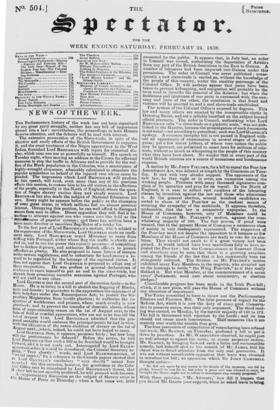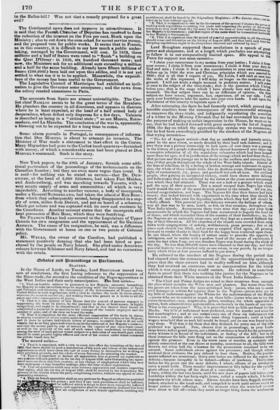NEWS OF THE WEEK
• THE Parliamentary history of the week has not been signalized Lv any great party struggle, neither has any bill of importance passed into a law : nevertheless, the proceedings in both Houses deserve attention, and the debates will be read with interest.
The extensive prosecution of the Slave-trade, in spite of the abortive and costly efforts of the British Government to suppress it, and the cruel treatment of the Negro apprentices in the West Indies, furnished Lord BROUGHAM with topics for oratorical dis- play, which none can use so powerfully as himself. His speech on Tuesday night, when moving an address to the Crown for effectual measures to stop the traffic in Africans and to provide for the wel- fare of the Black population in the Colonies, was a masterpiece of highly-wrought eloquence, admirably calculated to stimulate the popular sympathies on behalf of the injured race whsse cause he pleaded. The impression which Lord BROUGHAM will produce by this speech, will tend, even more than any of his previous efforts this session, to restore him to his old station in the affections of the people, especially in the North of England, where the ques- tion of Negro slavery excites deep and steady concern. Lord Baotharrars has also made the subject of National Education his own. Every night he appears before the public as the champion of some great cause, in which millions feel an almost personal interest. Occupying this position, he can well afford to disregard sneers from men in office. Direct opposition they will find it ha- sardous to attempt against one who comes into the field as the ''asiaseallatistive of popular opinion ; and there has seldom been a more :louts detector or tneraessIlagalator of a tricky foe. To the first part of Lord BROUGHAM'S motion, Whi.di related to the suppression of the Slave-trade, Lord GI.KNIILG made an ineffi- cient reply. Lord BROUGHAM urged Ministers to cease from trifling with Portugal. under whose flag the traffic is chiefly car- ried on, and to use the power this country' possesses; of compelling her to declare it piracy, and authorize British officers to punish offenders as pirate. He also proposed to issue letters of marque under certaia regulations, and to substitute for head-money a re- ward to be regulated by the tonnage of the captured slaver. It does not appear that Lord GLENELO is prepared to adopt any of these suggestions. He was profuse in general declarations of readiness to exert himself to put an end to the slave-trade, but shrunk from promising coercive measures against Portugal, who will not yield to any other. Lord GLENELG met the second part of the motion fairly—in the Rouse. He is to bring in a bill to abolish the flogging of Blacks, male and female; to guarantee to the apprentices the enjoyment of their holydays under the Emancipation Act; to protect the Sti- pendiary Magistrates from hostile planters; to authorize the in- spection of workhouses and prisons, where much cruelty is how practised ; and to prevent the transfer of domestic slaves, whose term of apprenticeship ceases on the 1st of August next, to the lists of field or pranlial apprentices, who are not to be free till the lot of August 1910. Lord BROUGHAM admitted that the pro- posed ineastile would embrace the principal points he had in view, w,Itil.the:OicePtion of the entire abolition of slavery on the 1st of August next,;.,which, indeed, he could not have hoped to carry. Leal GLENELG then, it appears, promises fairly ; but how long will the performance be delayed? Before the recess, he told Baornitsst that such a bill as he described would be brought firWaill,"aii,1 it is not ready yet. Interrogate( by Lord ELLEN- itcRotiGH.when it would be introduced, the Colonial Secretary re- Very shortly ; " words, said Lord ELLENBOROUGH, Of "as tul import," for a reference to the Canada papers showed that in Lod GLENELG's vocabulary '' very shortly " meant four tbonl hs I On this occasion, however, the gentlemen at the Colo- ma! Office may be stimulated by Lord Buouurram's threat, that if ;heir bill be not o speedily produced, he will proceed with his own.
supplementary discussion on the subject of Slavery arose in the House of Peers on Thursday ; when a fact cause out, little
suspected by the public. It appears that, in July last, an order in Council was issued, authorizing the deportation of Asiatics from any part of the British dominions in the East to Guiana. A number of labourers had been imported into Guiana under this permission. The order in Council was never published; conse- quently a new slave-trade is carried on, without the knowledge of the people of this country, under the stealthy patronage of the Colonial Office. It will perhaps appear that pains have bees taken to prevent kidnapping, and emigration will probably be the term used to describe the removal of the Asiatics; but when the feebleness and ignorance of one party is contrasted with the cun- ning and force of the other, the conclusion is that fraud and violence will be resorted to, and a real slave-trade established.
The system of the Colonial Office is exposed by degrees. This law and many others are enacted by the irresponsible clerks in Downing Street, and not a syllable breathed on the subject beyond official precincts. The order in Council, authorizing what Lord BROUGHANI calls "a slave-trade on a gigantic scale," was not pub- lished in the Gazette, because the promulgation of such documents is not usual—not according to precedent; such was Lord GLertELa's apology. A common turnpike bill is not passed in England with- out an opportunity of examination in several stages of its pro- gress; yet a few secret jobbers, of whose very names the public may be ignorant, are permitted to enact laws for millions of colo- nists, without so much as whispering to the people of this country what they have been about. No wonder that in every part of the world British colonies are a source of uneasiness and burdensome expense. A motion by Mr. Joust Fut LDE tr, for a bill to repeal the Poor-law Amendment Act, was debated at length by the Commons on Tues- day. It met with very slender support. The opponents of the new law, be they right or in error, are numerous among the working people. Petitions with many thousand signatures com- plain of its operation and pray for its repeal. In the North of England, it is easy to collect vast numbers of the labouring classes by invectives against the law and those who administer it. At the general election, several hundred candidates re- sorted to abuse of the Poor-law as the readiest means of securing the sympathy of the multitude. It appears, therefore, undeniable, that the law is extensively unpopular. In the House of Commons, however, only 17 Members could be found to support Mr. FIELDEN's motion, against the over. whelming majority of 309. The fact proves, if proof were "wanted, that in the present House of Commons a numerous class of society is very inadequately represented. The supporters of the Poor-law must not despise the opposition to it because so few Members of the House of Commons are ready to vote for its abo- lition. They should not exult as it' a great victory had been gained. It would indeed have been marvellous folly to have re- pealed the Poor-law ; but the Commissioners at Somerset [louse and elsewhere may bo sure, that there is a growing suspicion among the friends of the law that it has occasionally been too stringently enforced. The division on Mr. FIELDEN s motion exhibited many Tory Members in the majority, who scrupled not
.
on the hustings to revile " the Whig Poor-law," as they really disliked it. But what Member, at the commencement of a seven years' Parliament, need care about consistency, or election pledges ? Considerable progress has been made in the Irish Poor-bill; which, it is now plain, will pass the House of Commons without any alteration of importance.
The Tories assembled in fOrce to throw out the Parliamentary Electors and Freemen Bill. The false pretence of regard for the Reform Act, which it is now the duty of every good Coaserva- tive to preserve entire, was their only argument. The third read- ing was carried, on Monday, by the narrow majority of 189 to 172. The bill is threatened with rejection by the Lords ; and its loss should not cause much lamentation. Half-measures like it are scarcely ever worth the trouble they give.
The true preventive of intimidation of voters having been refused last week, Mr. SLANEY, on Thursday, produced a bill to put it down by penalties. As Mr. W ARBURTON observed, he might just as well attempt to square the circle, or, create perpetual motion. Mr. SLANEV, by bringing forward such a futile and contemptible remedy, laid himself open to the remark .'of Mr. JAMES, that his object was to divert attention from the only real preventive. It was not without considerable opposition that leave was obtained to introduce the bill ; an opposition which Sir IOHN CAMPBELL thought unfair- " lie did not agree by any means in the details of the measure, nor did he pledge himself to vote for it ; but when a great evil was allowed to exist, he thought the Miura ought not to refuse to investigate any remedy proposed."
With these opinions, " Mr. Attorney,- how did it happen that you denied Mr. GROTE your support, when he asked leave tabling
in the Ballot-bill? Was not that a remedy proposed for a great evil? •



























